fake Christian what you know ?Putin looks tough on the outside.
One gentle gay touch could easily made him suffer a panic attack!
-
IP addresses are NOT logged in this forum so there's no point asking. Please note that this forum is full of homophobes, racists, lunatics, schizophrenics & absolute nut jobs with a smattering of geniuses, Chinese chauvinists, Moderate Muslims and last but not least a couple of "know-it-alls" constantly sprouting their dubious wisdom. If you believe that content generated by unsavory characters might cause you offense PLEASE LEAVE NOW! Sammyboy Admin and Staff are not responsible for your hurt feelings should you choose to read any of the content here. The OTHER forum is HERE so please stop asking.
You are using an out of date browser. It may not display this or other websites correctly.
You should upgrade or use an alternative browser.
You should upgrade or use an alternative browser.
Putin to apply more butter on his ass & to join Hermit kingdom and other outcasts
- Thread starter Jar Jar Binks
- Start date
Rouble trouble: Russia forecasts economic slump as bailed-out bank gets more funds

Rouble slips despite government pressure on exporters
Tom Mendelsohn Author Biography , Darya Korsunskaya , Vladimir Abramov
Friday 26 December 2014
Russia looks set for a steep recession in 2015, its finance minister has admitted, as he stepped up the bailout of the first bank to teeter in the face of the collapsing rouble.
Western sanctions imposed during the Ukraine crisis has caused foreign investors to leave the country in droves, which, together with the current slump in oil prices, has caught the Russian economy in the jaws of a trap that's pummelling the rouble and tanking the economy.
The Russian government is now desperately attempting to sure up its major banks and find a way out of its deepening currency crisis. One such gambit has been a sudden hike in the interest rate, but economists remain doubtful that it will help.
Finance Minister Anton Siluanov predicted that the economy could shrink by as much as four per cent in 2015, which would be Russia's first contraction since 2009, if oil prices maintained their current level of $60 a barrel.
Siluanov also said the country would run a budget deficit of over three per cent next year if the oil price did not rise.
"Next year we will, without doubt, have to bring the Reserve Fund into play," he said, referring to one of Russia's two rainy-day funds intended to support the economy at times of crisis.
Crude prices have almost halved from their June peak amid a global glut and a decision by producer group OPEC not to cut output. Saudi Arabia said on Friday it was prepared to withstand a prolonged period of low prices.
"We need to have our budget break even at $70 per barrel by 2017," said Siluanov.
Russia's government imposed informal capital controls this week, including orders to large oil and gas exporters Gazprom and Rosneft to sell some of their dollar revenues in a bid to shore up the rouble.
Russians have kept a wary eye on the exchange rate since the collapse of the Soviet Union, when hyper-inflation wiped out their savings over several years in the early 1990s.
The rouble's will inevitably lead to higher inflation next year, which after years of stability threatens President Vladimir Putin's reputation for ensuring Russia's prosperity.
Additional reporting by Reuters
Rouble's fall has created turbulence for Russian airlines
While nation's carriers are benefiting from drop in oil prices, many expenses are paid in foreign currencies and fewer locals are flying
PUBLISHED : Sunday, 28 December, 2014, 10:47pm
UPDATED : Sunday, 28 December, 2014, 10:47pm
Agence France-Presse in Moscow
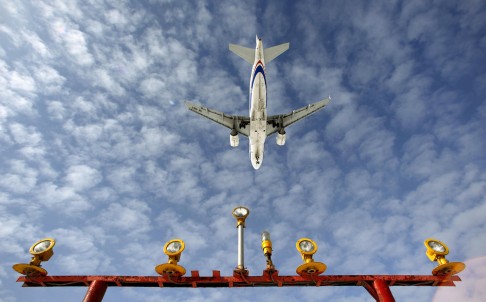
An Airbus A-319 jet prepares to land in Moscow. Photo: Reuters
Their international competitors may be cheering tumbling oil prices, but the collapse in the rouble has meant major financial turbulence for Russian airlines who have expenses in foreign currencies.
The rouble has slumped by 40 per cent this year against the dollar and euro, mostly due to crude oil prices falling by half in the past six months as Russia's economy is heavily dependent upon oil exports. As jet fuel accounts for upwards of a quarter of the cost for flights, most airlines are set to see a boost to earnings.
Russian airlines also stand to benefit, but that is expected to pale in comparison to the double whammy resulting from the drop in the value of the rouble.
First, traffic on their most profitable international routes has dropped as Russians stopped travelling as their purchasing power has been eroded, not to mention ticket prices being jacked up twice by 10 per cent.
Second, the airlines have considerable costs in foreign currencies - mostly aircraft leases - which have nearly doubled in rouble terms as the currency has slumped.
According to Deutsche Bank, Russia's leading airline Aeroflot earns 90 per cent of its revenue in roubles while 60 per cent of its costs are in foreign currencies.
"The situation is very serious," said Oleg Panteleyev, the editor-in-chief of the specialist website AviaPort. "The result is obvious: as a drop in traffic is inevitable, they must return planes to lessors, reduce foreign currency costs and lower the number of planes and flights," he said.
With traffic rising by 15 to 20 per cent annually in recent years, Russian airlines have leased and ordered new planes from Airbus and Boeing in order to retire their ageing fleet of gas-guzzling Russian aircraft.
Uncertainty has hovered for weeks over the third-largest Russian airline, Utair. Unable to repay some of its debts, Alfa Bank has been trying in court to seize its aircraft.
Then this past week doubts began to surface about the finances of No 2 airline Transaero, which boasts a fleet of more than 100 mostly Boeing aircraft. The Tass news agency reported that it had appealed to the government for help to avoid having to suspend flights.
Even if Transaero denounced the report as an attempt to destabilise it by competitors, the possibility of thousands of Russian tourists stranded abroad as happened this past summer when a number of travel agencies went bust was enough to prod the government into quick action.
Anxious to show it was moving to contain the effects of the currency crisis, the government promised to help airlines by subsidising domestic routes and providing loan guarantees to ensure airlines had access to funds.
On Wednesday Transaero was granted a loan guarantee of 9 billion roubles (HK$1.3 billion). The same day Alfa Bank said it was temporarily suspending, "at the request of the government", its legal action against Utair in order to avoid disruptions to flights during the upcoming holidays.
Panteleyev said "obtaining loans is indispensable ... to pay for jet fuel, airport fees and salaries, but it isn't sufficient to survive". With the Russian central bank expecting the country's economy to contract by nearly 5 per cent if oil prices remain at current levels and for there to be no recovery before 2017, there won't be an easy out for airlines.
Deputy Prime Minister Arkady Dvorkovich warned the airlines that the government aid would not help unless they optimised their fleet and routes and cut costs. Their owners would also have to pump money into them, he said.
Putin tells Russians to steel themselves for tough year ahead
PUBLISHED : Friday, 02 January, 2015, 3:19am
UPDATED : Friday, 02 January, 2015, 3:19am
Washington Post in Moscow
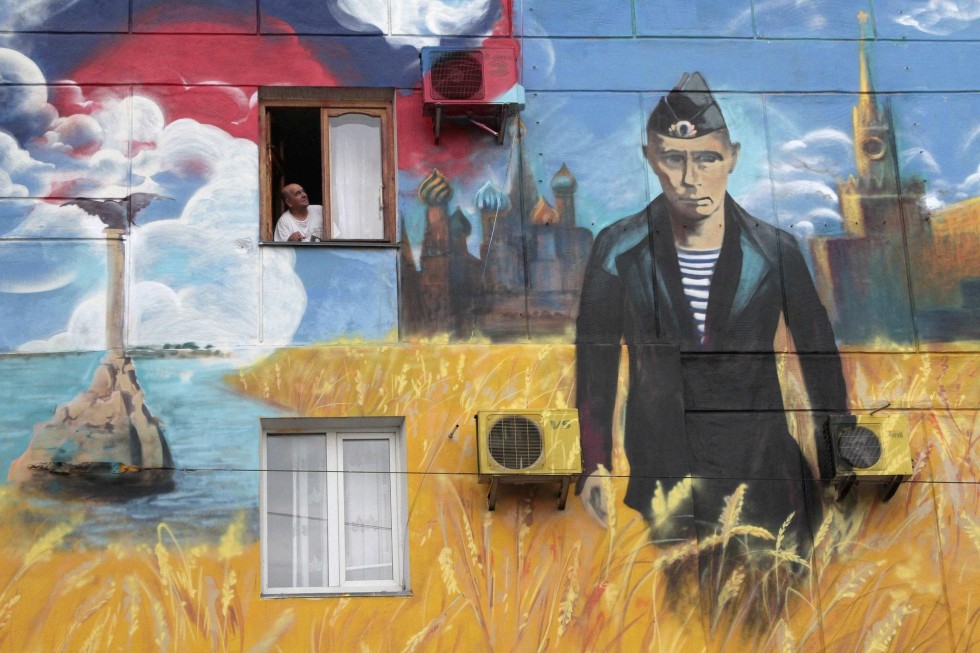
A mural in Sevastopol, Crimea of Putin, who still commands strong support at home. Photo: Reuters
The annual New Year's address in Russia, given in the waning moments of the old year, is usually a chance for the president to list the country's accomplishments, recall the year's high points and wish everyone a happy holiday.
But as Russian President Vladimir Putin rang in 2015, his tone was decidedly more measured as he glossed over the bulk of geopolitical shifts Russia experienced or caused in the past year, and quietly warned the Russian people to brace for more hardships.
Remember that Crimea is ours, he said, and that the Olympics were a success - and thanks for sticking together through everything else. Please continue to do so.
Putin has managed to ride through a year of geopolitical ups and downs with his approval rating at about 85 per cent last month.
But the events of 2014 pose a challenge to Putin's legacy, built on his reputation as a leader who brought prosperity back to Russia after difficult years of post-Soviet transition.
In the past nine months - since the annexation of Crimea - Russia has witnessed its relations with the West deteriorate to levels of hostility not seen since before perestroika.
Its major industries have been all but locked out of the global lending markets, and the value of the rouble and the price of oil - exports of which form the bedrock of Russia's economy - have plummeted.
The events of last year not only soured Russia's diplomatic relations with the West, but also have refuelled the ambitions of a dormant opposition movement at home, members of which rallied outside the Kremlin to call for a new president on the eve of Putin's New Year's address.
And just the day before Putin's taped address aired on television stations across the country at midnight on Wednesday, Russia's finance minister forecast harder times.
"We are going to have to use our safety cushion," Anton Siluanov said in an interview on state television station Rossiya 24.
Yet dire warnings and developments have done little to inspire a backlash against Putin.
Instead, many ordinary Russians - encouraged by authorities - have adopted a heightened patriotism, girding themselves for tougher times as a way of supporting their country when many there believe the world is against them.
Putin tapped such sentiments in his New Year's speech.
"Love for the motherland is one of the most powerful, uplifting feelings," he said.
Earlier that day, as the Kremlin was offering New Year's greetings to the various leaders and governments of the world, Russia's Foreign Ministry was issuing a particularly strongly worded warning to the United States and Europe to butt out of Russia's domestic affairs.
"Our Western partners should have to deal with what is happening in their homes," said Konstantin Dolgov, the Russian Foreign Ministry's human-rights chief, listing among the United States' domestic problems the recently disclosed CIA torture abuses, the prisoners at Guantanamo Bay, the Ferguson protests - which Russian authorities and media have had a field day opining on - and the "murders of Russian foster children".
"If the West is offering us such standards of the rule of law, it is clearly not meant for us."
why is my song in this thread?
Further sanctions will destabilise Russia, German deputy chancellor warns
Sigmar Gabriel says some in the West seek to force Moscow into chaos over Ukraine, but that could have dire consequences far beyond Russia's borders
PUBLISHED : Sunday, 04 January, 2015, 8:51pm
UPDATED : Sunday, 04 January, 2015, 8:51pm
Agence France-Presse in Frankfurt
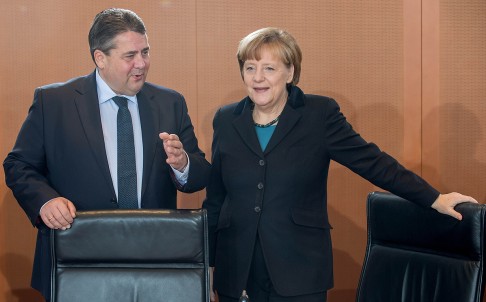
Germany's Deputy Chancellor Sigmar Gabriel with Chancellor Angela Merkel in Berlin in December 2014. Photo: AFP
Tougher sanctions may destabilise the situation further in Russia and plunge the country into chaos, German Deputy Chancellor Sigmar Gabriel warned in a newspaper interview on Sunday.
“The goal was never to push Russia politically and economically into chaos,” Gabriel told the Bild am Sonntag.
“Whoever wants that will provoke a much more dangerous situation for all of us in Europe,” he said, pointing out that Russia was a nuclear power.
The aim of the sanctions imposed against Russia so far was to steer the country back to the negotiating table.
“Those who want to destabilise Russia economically and politically even more are pursuing completely different interests,” said Gabriel, who is also Germany’s economy minister.
Some in Europe and in the United States want to see the old arch-rival Russia on its knees, but Gabriel said: “That is not [in] Germany’s or Europe’s interest.”
“We want to help solve the conflict in Ukraine, not to force Russia to its knees,” he said.
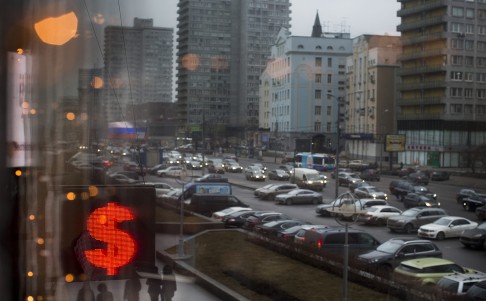
A sign on a Moscow street indicates the spread on the dollar-rouble rate. Photo: AP
The West has repeatedly accused Russia of stoking the Ukraine crisis by supplying weapons and troops to the rebels. Moscow denies the charge.
Sanctions imposed by the European Union and the United States, along with plunging oil prices, have sent the rouble crashing by some 40 per cent against the US dollar last year.
Russia 'has deteriorated significantly' as Fitch cuts credit rating
Fitch has written a scathing assesment of Russia's economy after downgrading it to BBB

Valdimir Putin could see his country slump into a deeper recession if oil prices remain low, Fitch has warned Photo: EPA
By Andrew Trotman
10:42PM GMT 09 Jan 2015
Fitch has downgraded Russia's credit rating and painted a horrific picture of a struggling economy rocked by a collapsing rouble, falling oil prices, high inflation and declining international reserves.
The ratings agency cut the country to BBB- from BBB with a negative outlook, meaning further downgrades are possible.
But it was the language Fitch used in its reasoning that was most shocking.
Russia's economic outlook "has deteriorated significantly" in just six months, Fitch stated. Gross Domestic Product will shrink 4pc this year, the agency added, far worse than the 1.5pc contraction it previously expected. "Growth may not return until 2017," Fitch said.
Western sanctions, imposed after President Vladimir Putin's took Russia into neighbouring Ukraine, "continue to weigh on the economy" but the plunging oil price is causing just as much, if not more, damage to one of the world's energy giants.
The price of a barrel of Brent crude has collapsed by more than 50pc since the middle of last year as Opec, the group of leading oil-producing nations, refused to cut production amid intense pressure from the US shale revolution.
"Plunging oil prices have exposed the close link between growth and oil price [in Russia]," Fitch wrote.
"Commodity dependence is high: energy products account for almost 70pc of merchandise exports and 50pc of federal government revenue, exposing the public finances and the balance of payments to external shocks," Fitch wrote.
Brent crude was trading at less than $50 a barrel on Friday, down from more than $111 in June last year.
Fitch has predicted that prices will recover to around $70 a barrel this year, a view shared by Igor Sechin, the chairman of Rosneft, which has been hit so hard by the oil price collapse that it has been forced to has request $46bn in state aid to help meet repayments and cover investment.
However, if oil stays significantly below $70 a barrel, "it could precipitate a deeper recession and put further strain on public finances, severely limiting the authorities' room for manoeuvre".
“If oil drops to $45 or lower and stays there, Russia is going to face a big problem,” said Mikhail Liluashvili, from Oxford Economics. “The central bank will try to smooth volatility but they will have to let the rouble fall and this could push inflation to 20pc.”
The rouble, which has slumped around 20pc since Christmas and was trading at 63 against the dollar on Friday, is in lockstep with Brent crude. Fitch cited the collapsing currency as one of the reasons Russia's banking sector has suffered a major shock, the others being "intense market volatility" and the central bank's decision to hike interest rates from 10pc to 17pc.
That shock move - Bank of Russia’s sixth increase in 2014 - took rates to heights not seen since the country’s default in 1998, and “is aimed at limiting substantially increased rouble depreciation risks and inflation risks”, the bank said.
Fitch expects Russian inflation, which stood at 11.4pc at the end of 2014, to remain in double-digits through this year before falling to 8.5pc by 2016. "The prospects of the [central bank] realising its end-2015 inflation target of 4.5pc now look remote, particularly if the exchange rate falls further, potentially leading to still higher interest rates," Fitch wrote.
This all comes as international reserves "fall faster than Fitch expected".
"Renewed intervention to support the rouble, whether by the central bank or the Finance Ministry, could further reduce reserves."
Russia's government has so far ruled out imposing capital controls to stem the outflow of money, knowing that such a move would go hand-in-hand with the loss of financial credibility.
However, Russia’s foreign reserves have dropped to the lowest level since the Lehman crisis.
Central bank data show that a blitz of currency intervention depleted reserves by $26bn in the two weeks to December 26, the fastest pace of erosion since the crisis in Ukraine erupted early last year.
Total reserves have fallen from $511bn to $388bn in a year. The Kremlin has already committed a third of what remains to bolster the domestic economy in 2015, greatly reducing the amount that can be used to defend the rouble.
Fitch ended its scathing assessment of Russia with a look at the country's government, labelling it a "weakness".
"Governance is a relative weakness: Russia scores badly on World Bank and Transparency International indicators, for example. Russia's current predicament has done little to hasten the onset of a more liberal economic policy agenda and raises the risk of greater isolationism. The business environment has long hampered diversification outside the energy sector."
where is the gay loser of this forum?
which loser?
President Putin says Russia is ready to work with the United States
PUBLISHED : Saturday, 18 April, 2015, 8:42pm
UPDATED : Saturday, 18 April, 2015, 8:42pm
Reuters in Moscow
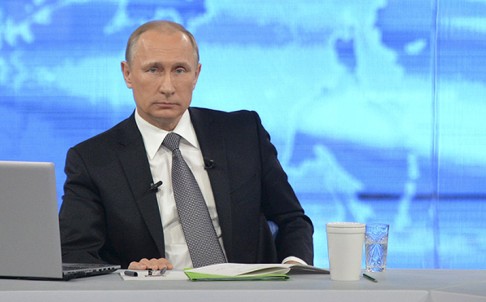
The Russian leader told a television interviewer Russia and the US share a common agenda. Photo: Reuters
Russia has key interests in common with the United States and needs to work with it on a common agenda, Russian President Vladimir Putin said on Saturday in a television interview.
In his comments to the state-run Rossiya channel, Putin appeared to soften his anti-American rhetoric after being highly critical in recent months. Relations between Moscow and Washington and other Western powers have soured over the conflict in Russia’s neighbour Ukraine, sinking to an all-time low since the cold war.
“We have disagreements on several issues on the international agenda. But at the same time there is something that unites us, that forces us to work together,” Putin said.
“I mean general efforts directed at making the world economy more democratic, measured and balanced, so that the world order is more democratic. We have a common agenda.”
Putin has in the past fiercely attacked the United States and the West in general, blaming them for the Ukraine crisis, which Russia says was the result of a Western-backed “coup” against Ukraine’s former leader Viktor Yanukovich.
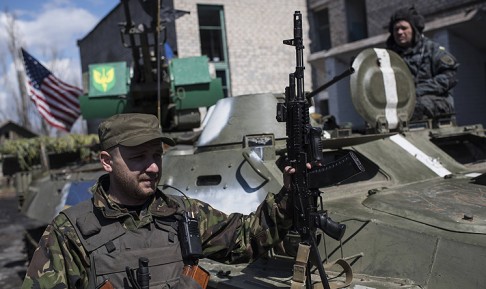
A serviceman stands near an armoured vehicle flying a US flag in Shyrokyne, eastern Ukraine, on Wednesday. Photo: AP
Russia has repeatedly denied accusations from Kiev and the West that it is supporting pro-Russian rebels with troops and weapons in eastern Ukraine, where more than 6,000 people have been killed since last April.
His latest remark comes two days after an annual TV phone-in show in which Putin accused the United States of trying to dominate world affairs, saying it wanted “not allies, but vassals”. However, his criticisms of the West were more moderate than in some previous appearances.
However, both Russia and the West say they back a peace deal agreed in Minsk in February, as a result of which a ceasefire in the Donbass region of Ukraine is largely holding.
Putin never invade Asian countries.
Sakhalin island invaded by Russians end of WWII and remain under Russian rule. Those were Japanese islands
I don't understand the west. They can agree to breaking up Yugoslavia into Serbia, Bosnia and creation and Macedonia and Albania etc, but on Ukraine, they insist that country cannot break up when it is evident the people there had split.
G7 warns Russia of more sanctions, pledges climate action
AFP
June 9, 2015, 4:10 am

United against Russian aggression , G7 to focus on jihadists United against 'Russian aggression', G7 to focus on jihadists
Elmau Castle (Germany) (AFP) - World leaders Monday warned Russia it would face stepped-up sanctions for its "aggression" in Ukraine, as they wrapped up a G7 meeting also pledging strong action to fight climate change.
At a luxury retreat nestled in the picture-perfect Bavarian Alps, the leaders of the most powerful countries also tackled threats to global security posed by Islamist extremism and risks to the world economy from Greece.
For the third time, Kremlin strongman Vladimir Putin was barred from a G7 summit due to what US President Barack Obama termed his "aggression in Ukraine", as the Group of Seven top powers closed ranks against Russia.
"We ... stand ready to take further restrictive measures in order to increase cost on Russia should its actions so require," said the leaders in a joint communique after the two-day huddle.
"We recall that the duration of sanctions should be clearly linked to Russia's complete implementation of the Minsk agreements and respect for Ukraine's sovereignty," the leaders added, referring to a peace deal struck in the Belarus capital.
The tough line from the world's power brokers came as Ukraine's defence minister accused pro-Russian rebels -- backed by Moscow -- of deploying an army of 40,000 men on the Ukrainian border, equivalent to a "mid-sized European state."
A recent flare-up in fighting in the east has left at least 28 dead and threatened the Minsk ceasefire deal.
Sanctions could also be "rolled back" if Russia lived up to its commitments, the communique said.
"Ultimately this is going to be an issue for Mr Putin. He's got to make a decision," said Obama.
"Does he continue to wreck his country's economy and continue Russia's isolation in pursuit of a wrong-headed desire to recreate the glories of the Soviet empire or does he recognise that Russia's greatness does not depend on violating" other countries' territory, he asked.
German Chancellor Angela Merkel, hosting the talks, noted Russia was involved in resolving several other global crises and called for their "cooperation."
Nevertheless, in a pointed barb at Moscow, she stressed that "the G7 shares common values like freedom, democracy and human rights. Therefore one can say that the G7 is a community that assumes responsibility."
- 'Hateful ideology' -
The leaders also sought to thrash out other threats to global security over a lunch of Thai chicken soup, trout and a peach dessert with almonds.
In an unusual move, the G7 leaders invited the heads of countries threatened by jihadist groups, including the leaders of Nigeria and Iraq, both battling deadly insurgencies.
Iraq's Prime Minister Haider al-Abadi was invited to discuss the US-led campaign to help his country fight the Islamic State extremists who launched a lightning offensive a year ago and have snatched over a third of the country's territory.
Abadi also got one-on-one time with Obama to discuss the Washington-led campaign to help Baghdad recover territory lost to IS militants, whose self-proclaimed "caliphate" extends deep into neighbouring Syria.
Another visitor to the summit, Nigeria's newly elected President Muhammadu Buhari, put a "shopping list" to the G7 leaders, seeking help to fight an insurgency by Boko Haram Islamists blamed for 15,000 deaths since 2009.
"We reaffirm our commitment to defeating this terrorist group and combatting the spread of its hateful ideology," said the leaders, in reference to the Islamic State group.
- Lederhosen and beers -
Meanwhile, ahead of a crunch year-end United Nations climate summit in Paris, the leaders stressed that "deep cuts in global greenhouse gas emissions" were required with "a decarbonisation of the global economy over the course of this century."
The aim was to send a clear signal to push other nations taking part in the Paris meeting to commit to reducing dangerous greenhouse gas emissions, which threaten to melt ice caps and glaciers, raise sea levels and bring more violent storms and floods.
Another pressing problem was the haggling between debt-hit Greece and its international creditors -- the EU, ECB and IMF -- and the fear that a messy default could lead to Greece exiting the eurozone, with unknown repercussions for the world economy.
Merkel warned "we don't have much more time" to resolve the debt crisis, with Athens and its creditors -- the IMF, the European Union and European Central Bank -- having been locked in negotiations for five months on reforms needed to unlock 7.2 billion euros ($8 billion) in rescue funds that Athens desperately needs.
And Obama stressed that Greeks would have to make "tough" choices in terms of reforms but said they would be positive in the long term.
As has become tradition at such gatherings, thousands of anti-G7 protesters marched over the weekend in largely peaceful and colourful demonstrations.
The summit also provided some folksy moments.
A candid photograph of Obama reclining on a wooden bench admiring the mountain view, while Merkel, facing him, holds her arms far apart caused some hilarity on Twitter, with users adding their own -- often highly inappropriate -- captions.
Stupid G-7 only hurt themselves deeper than Putin with ineffective dummy sanctions. 
EURO$ n US$ are themselves in deeper financial crisis and disarray much worse then Russian currency. This is a bunch of pathetically desperate clowns limping and crippled in their own lame ass, while attempting to break Russia's leg. Never realized their own legs had been long fucking broken.

Hahahahahaha!

EURO$ n US$ are themselves in deeper financial crisis and disarray much worse then Russian currency. This is a bunch of pathetically desperate clowns limping and crippled in their own lame ass, while attempting to break Russia's leg. Never realized their own legs had been long fucking broken.

Hahahahahaha!
Last edited:
Similar threads
- Replies
- 2
- Views
- 328
- Replies
- 4
- Views
- 723
- Replies
- 58
- Views
- 4K
- Replies
- 6
- Views
- 449
